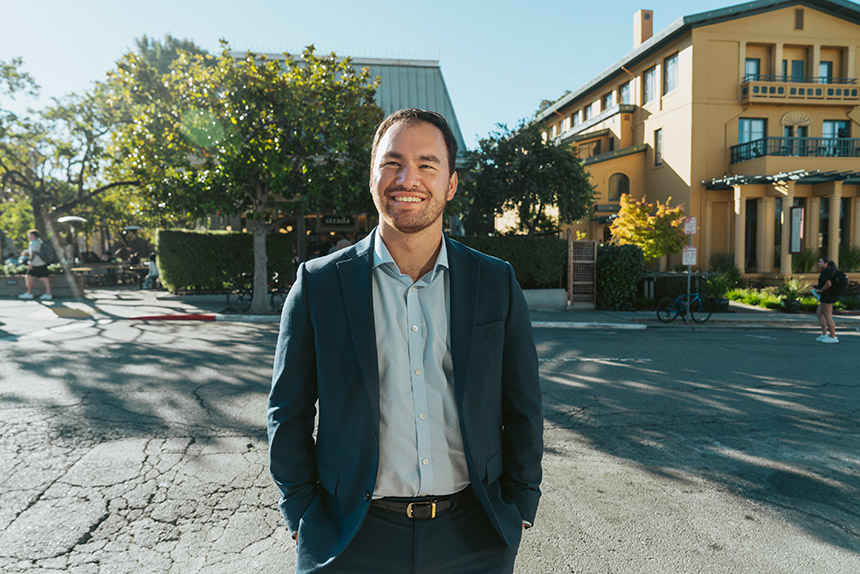
By Gwyneth K. Shaw
Josh Cayetano ’24 was just about to start college in 2014 when teenager Michael Brown was shot and killed by police officer Darren Wilson in Ferguson, Missouri. The tragedy — and the protests it sparked, which were met with a massive armed response from law enforcement — exposed him to a side of the police he hadn’t seen before.
Nine years later, with a strong record of activism and advocacy, Cayetano was recently appointed to the Berkeley Police Accountability Board (PAB) by the Berkeley City Council.
“I chose Berkeley Law largely because of the opportunity to make an impact as a student,” he says. “I never thought that it would put me here, but I’m grateful that it did.”
After Ferguson, Cayetano dug in, reading the report about Brown’s killing by the U.S. Department of Justice and focusing his studies on race and policing in America. He became even more engaged during his graduate studies at Yale, particularly after a Black woman was shot by city and campus police a few blocks from his home.
He penned an op-ed for the Yale Daily News condemning the agencies involved and calling for greater transparency and accountability. “How can we be national advocates for justice if we allow the injustices in our backyard to pass unnoticed?” Cayetano wrote.
“If there’s no eyewitness account to what has happened and no public pressure to release anything, we will stay in the dark,” he says. “I knew that if it wasn’t spoken about it wouldn’t get the attention that it warranted and needed.”
Drawn more to his activism than his graduate studies, Cayetano decided law school was the next logical step. As a 1L, he jumped right into the Police Review Project (PRP), one of the school’s 40 Student-Initiated Legal Services Projects, which had been a draw for him as a prospective student.
Hands-on advocacy
PRP has two branches: The first, which Cayetano worked with, pairs students with the ACLU Louisiana Justice Lab to help citizens — often low-income, people of color — challenge racially discriminatory policing practices and violent tactics.
In the second branch, law students help represent civilians who file complaints against members of the Berkeley Police Department with the PAB, a nine-member civilian panel.
Berkeley City Council member Rigel Robinson was impressed with the students’ work and reached out to the group’s leaders, ultimately nominating Cayetano for the PAB. His expertise as a PRP co-leader and his Yale organizing will make him an asset to the board, Robinson says.

“Mr. Cayetano is a rockstar, and a role model for those seeking to identify ways to serve their local community while being a student on campus,” he says. “The rift between town and gown can feel vast sometimes. One of the things I love most about my job is creating opportunities for students to have a seat at the table and play a direct role in affecting the policymaking process in Berkeley. Serving on a city commission is one critical way to do that.”
Gaining understanding
Cayetano says he’s excited about his four-year term, and is starting with simply getting to know how the Berkeley board functions. As he digs in, he can already see the tension between the original intentions behind the board’s creation — city voters approved it in 2020, in the wake of George Floyd’s murder, to reinvigorate the Police Review Commission — and how it’s working in practice.
“There are different philosophies regarding how to think about police accountability in our city and in our country. Probably the most conservative philosophy is to let the police oversee themselves,” he says. “The idea of civilian oversight is that civilians should have a say in how their communities are policed, and that the police should be accountable to the very community that they’re dedicated to serving — that civilians should be able to judge the correctness of police policies, practices, and procedures, especially when police action results in deadly force.
“That’s what I’m interested in doing, and it felt like Berkeley, where I’m going to school and living right now, is a good place to start.”
Cayetano says he’s grateful for how much he learned working with ACLU Louisiana, particularly how difficult it is for an average citizen — particularly one with few resources — to assert their constitutional rights. Trying to translate their experiences into legal claims takes a lot more work than it should, he adds, and that’s visible in Berkeley, too.
He also hopes to encourage other UC Berkeley students, at the law school and around campus, to engage with the city. He attended a recent Berkeley Law event featuring UC Santa Cruz Professor and legendary activist Angela Davis, who talked about how university students helped get her out of prison in the 1970s.
Students can have a similar impact today, Cayetano says, through projects like the PRP, direct activism, and other forms of engagement.
“We’re transient, but we’re also living here, in this liminal space,” he says. “I really hope Berkeley students can find ways they can give back to the community instead of simply extracting knowledge.”